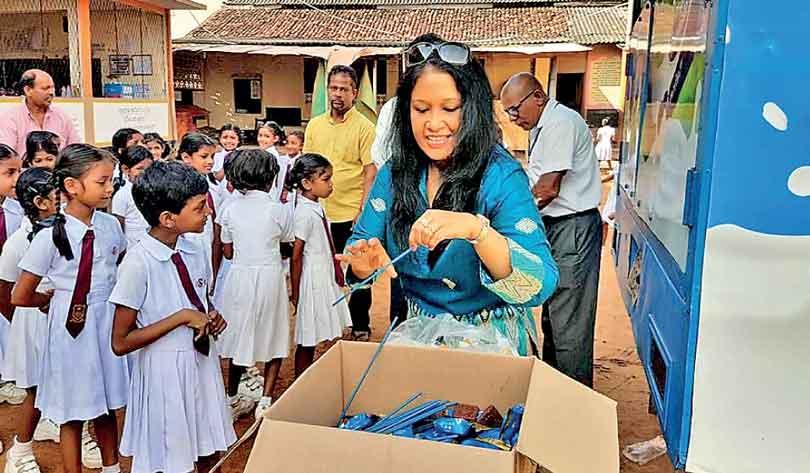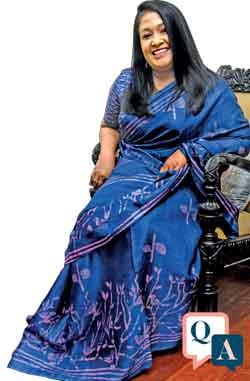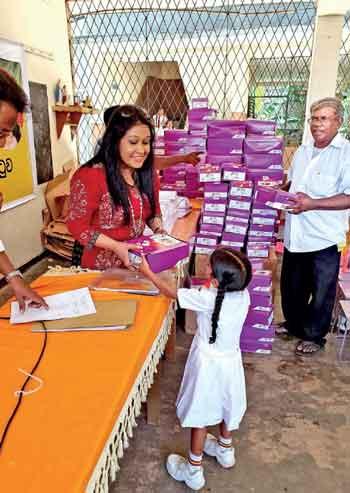
I would say I am reluctant to do so unless there is a sizable population of honest and ethical people who want to enter the political arena to make a difference; a handful of people cannot change the narrative.
 Tehani Sharnez Alenka Mathew (née Fernando) received her education at Ladies College, Colombo 7 and went on to do her Bachelor of Arts in Political Science at Columbia University, New York, and her Master of Science in Applied Psychology with Honours at the University of Colombo, Sri Lanka.
Tehani Sharnez Alenka Mathew (née Fernando) received her education at Ladies College, Colombo 7 and went on to do her Bachelor of Arts in Political Science at Columbia University, New York, and her Master of Science in Applied Psychology with Honours at the University of Colombo, Sri Lanka.
A director of many companies, her main commitment now is to the Expo 80 Foundation (Tyronne Fernando Foundation), Moratuwa Sri Lanka, where she is the Chief Trustee. She has held the positions of President Seva Vanitha Movement Ministry of Foreign Affairs, Sri Lanka, Volunteer Counsellor at Women in Need NGO, working on issues related to violence against women and children in Sri Lanka, Volunteer at Sahanaya Community Mental Health Services, Sri Lanka, President Seva Vanitha Movement Ministry of Information and Broadcasting, Sri Lanka, to name just a few. She is also a member of the Rotary Club of Colombo, the Women’s Chamber of Industry and Commerce, Sri Lanka, the Executive Committee of Women in Need, Sri Lanka, and a member of the American Alumni Association of Sri Lanka.
 1 Having studied Applied Psychology and Political Science, do you have plans to follow in your father’s footsteps?
1 Having studied Applied Psychology and Political Science, do you have plans to follow in your father’s footsteps?
People like my father joined politics in the seventies because they had a conviction they could build a better Sri Lanka . I remember him telling me that he felt that he either had to migrate or get into politics to facilitate the changes he wanted to see in the country. He had returned from Oxford University and Grey’s Inn and had a lucrative career in law ahead of him, but he sacrificed it all for an ideal and a vision . Today much has changed. The political landscape we are now living in is vastly different from the one that existed when my father made his entry into politics . Many setbacks have occurred to the victories hard won in the seventies. Successive Governments have overseen a steady and gradual erosion in norms and institutions. Honest and educated people like my father are reluctant to enter politics and even when they do they are so few in number that they are easily swallowed and do not survive for long in the shark pond. When I ask myself as a citizen of this country the simple question whether my ideals, values and belief systems are upheld by our representatives in Parliament the answer is a definite NO. The gradual and steady erosion of norms and institutions has led to increased levels of cynicism and lowered expectations in the minds of the younger generation concerning Governance. So when I am asked the question about following in my father’s footsteps I would say I am reluctant to do so unless there is a sizable population of honest and ethical people who want to enter the political arena to make a difference; a handful of people cannot change the narrative.
2 What in your opinion needs to be set in place to rectify the country’s many woes? we seem to be eternally teetering on the edge of disaster.
I believe the spark that stimulated the transition of the seventies can still be ignited if the Government is open to rectify the crisis of its own making. It is true that tourism , investment, exports and remittances are all sectors vulnerable to the covid pandemic that have contributed to declining foreign reserves. However having said that most of our neighbouring countries have seen a 20%to 40% increase in foreign reserves while we have seen a 80% decline. Maintaining foreign reserves is vital to the economic health of a Country and this is very depressing considering our advantageous geographical location , the belt/road initiative and our location on the trade route . Frugal and prudent we have not been as a Country. Government monopoly over state institutions, ad hoc short term interventions, misallocation of taxes, salary hikes to the already over-large ever-growing state sector before elections, political instability, large scale corruption , lack of transparency, lack of rule of law, budget manipulations to favor special interest groups , policies not based on economic realities but on political gains and restrictions to economic and civil freedoms have led to this downward spiral. The repercussions of this being a lack of investor confidence and the prediction of the growth rate further slowing down to 2% in 2022 from 3.6% in 2021. The ban on fertilizer overnight when the country was not ready for organic based agriculture have seen yields drop across all sectors of tea, rubber and coconut. No country in the world has made such a transition like this overnight. Even Cuba which switched to organic phased it out over ten years. The alleged violations of human rights may result in our preferential trade status being threatened. All these repercussions of poor management have led to a lack of investor confidence in our external debt obligations and a downgrading of our credit rating by Fitch to CCC. I am not an economist but I read what experts have to say . I can see that the options and solutions are available but one must learn to take them. Investors have confidence in the IMF so we must turn to them for a debt restructuring and support and open up multilateral financing in order to make progress. Whatever Government that comes into power must operate on a long term rule based policy based on a concrete strategy and plan. How long can Sri Lanka depend on neighbouring countries with vested interests to boost us with currency swaps which can only be a temporary solution. Most importantly it is imperative we have educated people in Parliament and the Cabinet. And I say this of all Governments and Parliaments not just the present one. If we look at the educational qualifications of the Cabinet of Singapore and compare that with ours I don’t need to say anything more. Singapore aspired to be like us in the sixties, now they are so far ahead while we have been left lagging behind.
 3 Does Statesmanship exist today in any part of the world?
3 Does Statesmanship exist today in any part of the world?
Although there are many definitions to the word I will go with the one that describes a statesmen or woman as a “ wise, skillful and respected political leader”. In my opinion Angela Merkel has demonstrated these qualities on many occasions, most notably in her empathy and moral stature during her handling of the European migrant crisis and her skilled and strategic handling of the Covid pandemic in Germany. Harvard University President Larry Bacow has described her as “ one of the most widely admired and broadly influential states-people of our time”.
4 What do you think are the most important principles to instill in a child?
Honesty and integrity; respect and moral obligation to all sentient beings ; learning to forgive; conservation and the ability to handle money wisely and being true to oneself while never worrying about what other people think or have to say. My grandmother the late Chloe De Soysa taught me this when I was still quite young. Having a father in politics from the time I was eight years old meant that I was exposed to a life of limelight because I was very involved with his political and social activities. Needless to say human nature being the way it is, I was the subject of gossip and chatter in social circles . I now understand that this is just the way people are, but at a young and impressionable age it was quite terrifying. One day I whined and complained about this to my grandmother and she asked me only one question. “ Are these people your role models” ? Of course they were not and I told her so. “ Then why bother about what they have to say about you ?“ she asked. From that day onwards it has never bothered me as to what people say about me. As long as I am true to myself and my belief system, that is all that matters.
5 What is a parent’s greatest challenge today?
The greatest challenge today is to make the younger generation realize that the subtle push towards conformity poses the greatest danger to humanity. Every generations mental framework of what is right or wrong is shaped by the collective experience that defines their formative years. It is easy to normalize and rationalize prejudice and inequality when that is all one has known as the norm. If we seek to reform the societies we live in, we must teach the younger generation to recognize the inner worth and dignity of all sentient beings and that evil will thrive if good people do nothing.
6 How involved are you with Expo 80 Moratuwa or the Tyronne Fernando Foundation?
My father started the Foundation in the eighties, with its mission being to help the economic and social welfare of the people of Moratuwa. It is a Parliamentary incorporated charitable trust gazetted by an act of Parliament. Ever since his demise in 2008 I have steered the Foundation as its Chief Trustee for a period of 14 years now. I am very actively involved and blessed to have ten dedicated trustees who work equally hard. However, neither myself nor any of the other trustees receive any remuneration from the Foundation. We all work on a voluntary basis.
7 How is it funded?
All these years we operated on our fixed deposit interest income as my father had left money and property in the name of the Foundation. However it is now getting increasingly difficult with low interest rates and the escalating demand for relief required by the people of Moratuwa. We have recently started to rely on donations from well wishers and friends of the Foundation.
8 Apart from yourself who are the other trustees?
Apart from myself we have ten other trustees as per the provision of the constitution. They are a cross section of people from Colombo and Moratuwa mostly made up of lawyers, professionals and businesspeople. The trustees are Lal Peiris ( Secretary), Prof Sharya Scharenguivel, Rasin Seneratne, Hirantha Rodrigo, Indraneela Fernando, Chathuri Ranasinghe, Anujath Fernando, Lankika Perera , Kshenuka Saparamadu and Lakmimi Wijesundera.
9 Could you briefly tell us the activities of the Foundation
The programmes we have undertaken over the last 14 years are too numerous to count but here are a few: milk and biscuit distribution to Moratuwa schools twice weekly, providing uniform materials and books to school children every year; building toilets and providing building materials and roofing sheets; providing dry rations and rice bags to over ten thousand families every year; providing scholarships and educational help such as laptops, textbooks and paying of tertiary or vocational education fees; providing electrical equipment and utensils for female entrepreneurs engaged in small scale business; helping differently abled children; Christmas party every year for 800 underprivileged children; sponsorship of deserving individuals and events; helping cancer patients with essentials; conducting free English classes; ongoing program for pregnant mothers for them to receive all the essentials they need to take to hospital with them. This is done with the corporation of the GMO. The names and the lists are both given by the GMO and the hospital; helping Lunawa hospital; helping children and adults undergoing medical treatment with costs towards medicine or treatment; facilitating educational opportunities and recreational activities to school children to broaden their outlook and perspective.
Main pic Nimalsiri Edirisinghe

 Tehani Sharnez Alenka Mathew (née Fernando) received her education at Ladies College, Colombo 7 and went on to do her Bachelor of Arts in Political Science at Columbia University, New York, and her Master of Science in Applied Psychology with Honours at the University of Colombo, Sri Lanka.
Tehani Sharnez Alenka Mathew (née Fernando) received her education at Ladies College, Colombo 7 and went on to do her Bachelor of Arts in Political Science at Columbia University, New York, and her Master of Science in Applied Psychology with Honours at the University of Colombo, Sri Lanka. 1 Having studied Applied Psychology and Political Science, do you have plans to follow in your father’s footsteps?
1 Having studied Applied Psychology and Political Science, do you have plans to follow in your father’s footsteps? 3 Does Statesmanship exist today in any part of the world?
3 Does Statesmanship exist today in any part of the world?